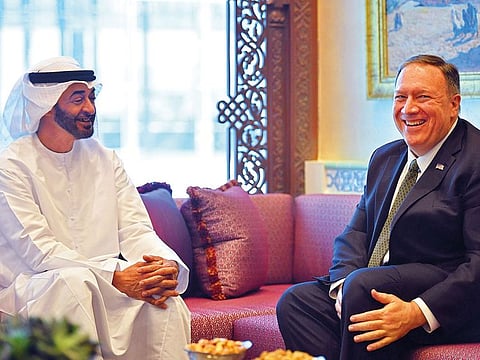Pompeo meets Mohamed Bin Zayed: UAE categorically rejects attempts to undermine Saudi Arabia's security
US discusses possible responses to a Saudi oil facility attack with Gulf allies

Dubai: US Secretary of State Mike Pompeo met with Sheikh Mohamed Bin Zayed Al Nahyan, Crown Prince of Abu Dhabi and Deputy Supreme Commander of the UAE Armed Forces on Thursday.
The meeting came a day after Pompeo met Saudi Crown Prince Mohammed Bin Salman in Jeddah.
Update
Sheikh Mohamed has re-affirmed the UAE's support for the Kingdom of Saudi Arabia against all the menacing threats besetting its security and stability.
Sheikh Mohamed made the statements as he received US Secretary of State Mike Pompeo at Qasr Al Shati' today, with the two sides deliberating the recent attacks on Saudi oil installations on Saturday and their repercussions on regional and international security.
"The UAE categorically rejects any attempts to undermine the Kingdom's security and stability and regards any threat to the Kingdom as a threat to international peace and security," Sheikh Mohamed added.
He underscored the UAE's principled support for preserving peace and stability in the Gulf region and the Middle East in cooperation with other sisterly and friendly countries, primarily the United States of America.
The two sides doubled on the importance of maintaining channels of bilateral coordination and continuing to solidify the pillars of peace and stability in the region.
Attending the meeting were H.H. Sheikh Tahnoun bin Zayed Al Nahyan, National Security Adviser; H.H. Sheikh Abdullah bin Zayed Al Nahyan, Minister of Foreign Affairs and International Cooperation; Ali Bin Hammad Al Shamsi, Deputy Secretary General of the Supreme Council for National Security; Ali Saeed Matar Al Neyadi, Chairman of the Federal Customs Authority; Khaldoon Khalifa Al Mubarak, Chairman of Abu Dhabi Executive Affairs Authority, and Mohamed Mubarak Al Mazrouei, Undersecretary of the Crown Prince Court of Abu Dhabi, as well as the US top diplomat's accompanying delegation.
Coalition to deter Iran
Pompeo said on Thursday the United States was building a coalition to deter Iran after an attack on Saudi Arabia’s oil facilities but it wanted a peaceful resolution.
“We are still striving to build out a coalition in an act of diplomacy while the foreign minister of Iran is threatening all-out war and to fight to the last American, were here to build up a coalition aimed at achieving peace,” Pompeo told reporters after meeting Sheikh Mohamed bin Zayed.
In the meantime, Pompeo promised to continue to impose sanctions on Iran to stop its support for terrorism, including Hezbollah militias.
He said he will give US President Donald Trump important information about the details of the attack on Aramco.
The United States was discussing with Saudi Arabia and other Gulf allies possible responses to an attack on Saudi oil facilities they blame on Iran and which Pompeo described as an act of war on the kingdom.
We are still striving to build out a coalition in an act of diplomacy while the foreign minister of Iran is threatening all-out war and to fight the last American.Mike Pompeo | US Secretary of State
U.S. President Donald Trump on Wednesday struck a cautious note, saying there were many options short of war with Iran, which denies involvement in the Sept. 14 strikes that initially halved Saudi oil output. He ordered increased sanctions on Tehran.
“This is an attack of a scale we’ve just not seen before,” Pompeo told reporters before landing in Jeddah.
“The Saudis were the nation that were attacked. It was on their soil. It was an act of war against them directly.”
Iran warning
Meanwhile, Iran’s top diplomat said Thursday that any attack on his country over a drone-and-missile strike on Saudi Arabia’s oil industry will result in “all-out war,” further pushing up tensions across the Arabian Gulf.
The comments by Foreign Minister Mohammad Javad Zarif represented the starkest warning yet by Iran in a long summer of mysterious attacks and incidents following the collapse of Iran’s 2015 nuclear deal with world powers, more than a year after President Donald Trump unilaterally withdrew the U.S. from the accord.
Zarif’s comments also appeared to be a response to Pompeo's "act of war" comments.
Asked by CNN what would be the consequence of a U.S. or Saudi strike, Zarif said: “All-out war.”
It would cause “a lot of casualties,” he stressed.
“I am making a very serious statement that we don’t want to engage in a military confrontation,” Zarif said. “But we won’t blink to defend our territory.”
He added that any sanctions placed by the U.S. on Iran after pulling out of the nuclear deal would need to be lifted before any negotiations could be considered.
'Everything is on the table'
On his part, the Saudi ambassador to Berlin said “everything is on the table”, telling Deutschlandfunk radio that options need to be discussed carefully.
Riyadh, which described the assault has as a “test of global will”, on Wednesday displayed the remnants of 25 Iranian drones and missiles it said were used in the strike as undeniable evidence of Iranian aggression.
The United Arab Emirates on Thursday followed its main Arab ally Saudi Arabia in announcing it was joining a global maritime security coalition that Washington has been trying to build since a series of explosions on oil tankers in Gulf waters in recent months that were also blamed on Tehran.
Meanwhie, France has sent seven military experts to investigate this weekend’s attacks on Saudi oil facilities, including specialists in explosives, missile trajectory and ground-to-air defense systems, a defense ministry spokeswoman said on Thursday.
Earlier in the day, French foreign minister Jean-Yves Le Drian mentioned the despatch of the experts. He also said a claim from Yemen’s Houthi rebels they were responsible for the attack on the Saudi oil facilities was “not very credible”.


